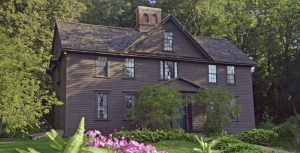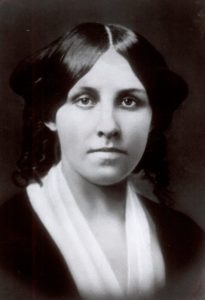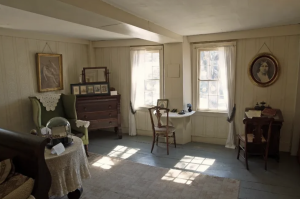Family and Changing the World: An Afternoon at Louisa May Alcott’s Orchard House
I spent the past week with family. On the last day of my youngest sister and my mom’s visit to Boston, we journeyed out to Concord to spend the afternoon at Orchard House — the home where Louisa May Alcott scribbled furiously away at a book about her and her three sisters, beloved around the world to this day as Little Women.
Like many girls across the globe, my two younger sisters and I grew up enchanted by this story, just like our mom before us. We were children who, like the March (and Alcott) sisters, loved to put on meticulously written and rehearsed plays, and swore that we would never love anyone else the way we did each other. So it was unsurprising just how much we related to these four girls when our mom introduced us to the 1994 film adaptation of Meg, Jo, Beth, and Amy’s lives; and just two years ago we sat tearfully in the movie theater watching Greta Gerwig’s acclaimed version, which resonated just as deeply for different, more grown-up reasons now that we are different and more grown-up. My littlest sister, who adores Alcott’s book and is a talented artist just like young Amy, knew that when she visited her two older siblings in Massachusetts, Orchard House was the highest-priority destination.

Concord is a beautiful place, and with the deep reds, browns, and oranges adorning every tree at this time of year, it seems especially magic — not to mention conducive to great art and philosophy. “There was something in the air here,” my middle sister mused upon realizing just how close the home of the Alcotts was to that of their dear friends Ralph Waldo Emerson, Henry David Thoreau, and Nathaniel Hawthorne. The Alcotts’ parlor was frequented by these and other Transcendentalist thinkers, where conversations about such subjects as abolition, education, suffrage, and the restorative powers of nature flourished — conversations in which, unlike in most contemporary households, the Alcott girls and women were allowed and encouraged to participate.

No wonder, then, that Louisa May felt perfectly comfortable making such unconventional decisions as leaving home to serve as a Civil War nurse, refusing to ever marry, and making her living as a writer.
Like other historic house museums, the introductory video and guided tour at Orchard House give plenty of focus to the daily lives of the Alcott family — Bronson and Abigail, and their four daughters Anna, Louisa, Elizabeth, and May — that inspired the events of Little Women. But the ideals and actions of the Alcotts, which make them so extraordinary both in their day and ours, are what truly take center stage at this museum.
This was a family who not only talked about abolition but provided asylum to fugitive enslaved people, refused to wear cotton produced by the enslaved, and provided shelter to radical abolitionist John Brown’s widow and daughters after his execution. They were vegetarians in an era when the humane treatment of animals was hardly a thought for most people; they advocated for education reform which would lead to the end of physical punishment and more time for children to spend outdoors; they fought for women’s rights and ensured that the women in their family receive the best opportunities to follow their dreams. In an especially touching display of parental love and belief in his children’s gifts, Bronson Alcott built a writing desk for Louisa and an art studio for May, both of which visitors see on the tour.

Our time at Orchard House concluded with a call to action, imploring us to embody one of the Alcott family’s main tenets: to believe in our fellow human beings and support their dreams and aspirations. Who knows how many of today’s children might grow up to be Louisa May Alcotts, if only their gifts and beautiful minds are fostered and believed in, the way hers were?

After snapping plenty of sister and mother-daughter photos outside the house, we took our time on the walk back to the train station — paying special attention, now, to the autumn leaves, the fallen black walnuts, a rainbow in the sky. We talked about family, about beauty, about love and kindness, about standing by one’s convictions no matter how fierce the opposition, about daring to look at the world in a different way. We talked about the power of believing in each other and those around us.
Orchard House provides a prime example of all that historic house museums can accomplish in our current moment. Rather than highlight the furniture, clothing, food, and daily life of a particular era, or limit its interpretation to poignant but ultimately shallow anecdotes about a single historical family, this museum seeks to stir something deeper in the hearts of those who walk through its doors. It encourages visitors to do right, to think anew, and to undertake what is sometimes the bravest, most unconventional challenge: practicing kindness. On the pages of Little Women, and in every room at Orchard House, this important legacy permeates.
For more information on Orchard House and how to plan your visit, check out their website here.